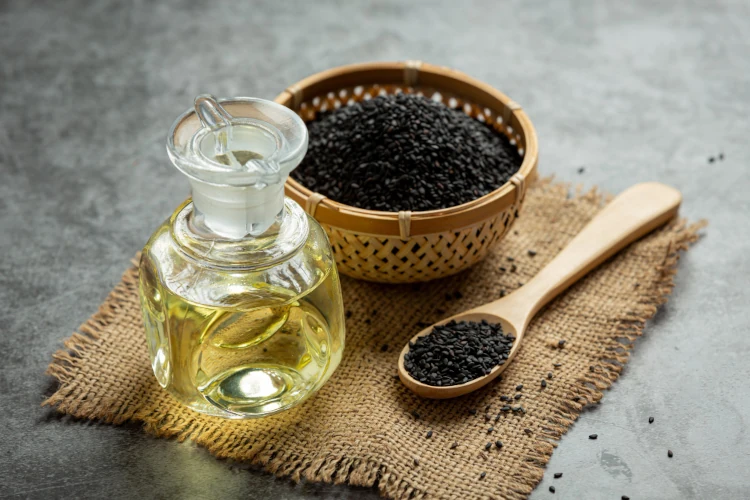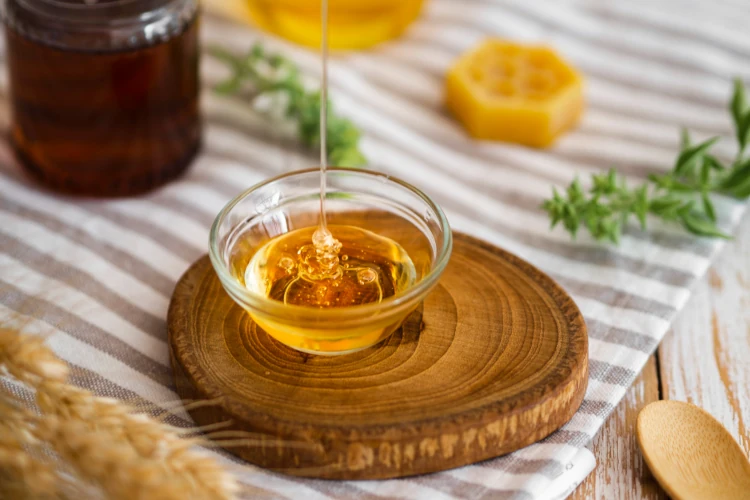Prophet Muḥammad (S):
“In it (black seed) there is a cure for every disease except death.” (Ṣaḥīḥ Al-Bukharī and Ṣaḥīḥ Muslim)
“We went out, and Ghalib Ibn Abjar was accompanying us. He fell ill on the way, and when we arrived in Madinah, he was still sick. Ibn Abi ‘Atīq came to visit him and said to us, ‘Treat him with black seed. Take five or seven seeds and crush them (mix the powder with oil) and drop the resulting mixture into both nostrils.’”(Ṣaḥīḥ Al-Bukharī)
How to use:
Black seed is the flowering Nigella Sativa plant that produces tiny black seeds. Due to its appearance, its common names include black cumin, black caraway, and onion seeds, though it should not be confused with actual cumin, caraway, or onion in any way. Its medicinal use dates back more than 2,000 years ago to Ancient Egypt. Its taste is bitter and slightly spicy. In cooking, black seed sometimes is used as a spice and in some breads for flavor.
Some commercial preparations of black seed are adulterated with other seeds or mixed with other similar-looking oils. Black seed can be consumed in its raw seed form, crushed, or as its oil. Its oil should be cold-pressed, and unfiltered. As a supplement, it is often sold in capsule form. It can be taken orally, applied topically, or 1-2 drops of oil may even be dropped into the nose. The seeds can be taken around 1-5 grams per day while the oil dose averages ½ – 1 tsp daily. Consult with your physician before using for your particular condition.
Allergic reactions from black seed are rare and pregnant women should limit intake of black seed oil. Black seed can increase the effects of medicines that lower blood sugar and blood pressure. In Ayurveda, Unani Medicine, and Chinese medicine, the black seed is considered a hot herb, so some experts recommend taking it for a therapeutic dose followed by a resting period.
Benefits:
- Benefits diabetes, controls insulin, lowers obesity, lowers blood pressure, LDL cholesterol, triglycerides.1 2
- Anti-cancerous3, Anti-inflammatory, anti-allergic, anti-asthmatic.4
- Anti-bacterial, anti-viral, anti-fungal.5
- Improves male fertility.6
- Benefits rheumatoid arthritis.7
- Benefits skin, reduces acne, psoriasis, heals wounds (use oil form).8 9
- Ingredients include fatty acids, B vitamins, Vitamin A, copper, iron, zinc, phosphorous, and thymoquinone
Overall benefits are summarized in “Black Seed- Nature’s Miracle Remedy” and healthline.com10 There are more than 2,000 published studies related to black seed in the Pub Med research database!!!
CLINICAL PEARL
I have found black seed oil to be particularly effective in helping allergy, asthma and immune deficiency syndromes. An 11 year old boy who visited me for asthma took a combination of black seed oil, honey, and garlic at a dose of 1 teaspoon daily for over one year. When I saw the patient again after 1 year, the boy and his parents reported that his asthma was completely gone! Another male in his 50’s visited me complaining of chronic sinus congestion due to allergies. After using black seed oil drops in his nose for 2 weeks he reported a 70% drop in his level of congestion. His sinus congestion continued to be manageable as long as he used a maintenance dose of black seed oil.
References:
1. Heshmati, J et al. (2015). Nigella sativa oil affects glucose metabolism and lipid concentrations in patients with type 2 diabetes: A randomized, double-blind, placebo-controlled trial, Food Research Intl, April, Vol 70: p. 87-93.
2. Mahdavi, R., Namazi, N., Alizadeh, M., & Farajnia, S. (2015). Effects of Nigella sativa oil with a low- calorie diet on cardiometabolic risk factors in obese women: a randomized controlled clinical trial. Food & function, 6(6), 2041–2048.
3. Mahmoud, Y. K., & Abdelrazek, H. (2019). Cancer: Thymoquinone antioxidant/pro-oxidant effect as potential anticancer remedy. Biomedicine & pharmacotherapy = Biomedecine & pharmacotherapie, 115, 108783.
4. Keyhanmanesh, R., Gholamnezhad, Z., & Boskabady, M. H. (2014). The relaxant effect of Nigella sativa on smooth muscles, its possible mechanisms and clinical applications. Iranian journal of basic medical sciences, 17(12), 939–949.
5. Forouzanfar, F., Bazzaz, B. S., & Hosseinzadeh, H. (2014). Black cumin (Nigella sativa) and its constituent (thymoquinone): a review on antimicrobial effects. Iranian journal of basic medical sciences, 17(12), 929–938.
6. Kolahdooz, M., Nasri, S., Modarres, S. Z., Kianbakht, S., & Huseini, H. F. (2014). Effects of Nigella sativa L. seed oil on abnormal semen quality in infertile men: a randomized, double-blind, placebo- controlled clinical trial. Phytomedicine : international journal of phytotherapy and phytopharmacology, 21(6), 901–905
7. Kheirouri, S., Hadi, V., & Alizadeh, M. (2016). Immunomodulatory Effect of Nigella sativa Oil on T Lymphocytes in Patients with Rheumatoid Arthritis. Immunological investigations, 45(4), 271–283
8. Eid, A. M., Elmarzugi, N. A., Abu Ayyash, L. M., Sawafta, M. N., & Daana, H. I. (2017). A Review on the Cosmeceutical and External Applications of Nigella sativa. Journal of tropical medicine, 2017, 7092514.
9. Yousefi, M., et al. (2013). Comparison of therapeutic effect of topical Nigella with Betamethasone and Eucerin in hand eczema. Journal of the European Academy of Dermatology and Venereology : JEADV, 27(12), 1498–1504.
10. See W.G. Goreja (2003), Black Seed: Nature’s Miracle Remedy, Amazing Herbs Press, NY; and https://www.healthline.com/health/food-nutrition/black-seed-oil-benefits.
Other Articles
Hijamah Mechanism- Taibah Theory
https://www.researchgate.net/publication/327810434_Taibah_mechanism_Taibah_Theory
How Islam Changed Medicine By Azeem Majeed
https://pmc.ncbi.nlm.nih.gov/articles/PMC1322233/
The Air of History Part III: The Golden Age in Arab Islamic Medicine- An Introduction By Rachel Hajar https://pmc.ncbi.nlm.nih.gov/articles/PMC3621228/


